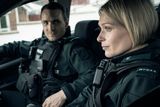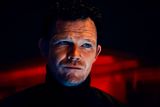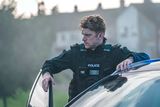Blue Lights series 2, episode 3 review: Weight of duty takes its toll after sudden death in brave and timely sub-plot



It’s a frequently discussed opinion that Blue Lights paints Belfast (and, to some, the PSNI) too negatively.
Naive viewers could accuse the series of being too paramilitary focused, both loyalist and republican, with its new recruits only ever finding themselves caught up in constant ‘simmering tensions’.
It’s true: the crux of the show aims to look at the paramilitary world of Northern Ireland, and it does it well. However, as we now see in the third episode of Declan Lawn and Adam Peterson’s drama, it’s the storylines which touch on other elements of humanity that makes the series soar.
Monday night’s latest episode does this extraordinarily well. In a side-plot focused (thankfully) not on Stevie and Grace’s will-they-won’t-they relationship, it instead looks at a tragic call to a suspicious sudden death.
Upon arriving at a property, where they are greeted by a confused and dishevelled man named Chris (Craig Robinson), the officers are soon forced to confront the raw vulnerability of human connection in the face of an impossible situation.
We soon learn that Chris’ husband — ill with terminal lung cancer — has died unexpectedly, with a lot of his pain medication missing.
A carer on the scene, having called the police, expresses her suspicions to Grace and Stevie, believing Chris may have had a hand in assisting his husband’s death.
It’s a brave storyline to incorporate the debate around assisted dying in Northern Ireland. It couldn’t be more timely, and, luckily, the series decides not to preach, but instead simply portray.
We see the weight of duty etched on Grace's face as she reminds Stevie, “We have no choice,” speaking about a potential arrest of Chris on suspected murder charges, noticing her partner has taken an unsettled approach to the ordeal.
The camera lingers on Stevie, a subtle tremor betraying the turmoil within. This isn’t just another job; it’s a painful echo of his own loss, a wife taken by a similar illness.
Martin McCann excels here in just a few glances during the scenes, right from his brief pause upon entering the room.
The inevitable arrest is a gut punch. Stevie, the upholder of the law, becomes the instrument of its enforcement, his heart heavy with empathy for Chris’ act of love.
It’s a performance that deserves a standing ovation — a tapestry of conflicting emotions interwoven with heart-breaking nuance.
Praise must also be given to the decision to present Grace, often more social worker than cop, taking the lead in her duties with the inevitable arrest, allowing the viewer to confront the human cost of such decisions.
There’s no pandering here, but rather a real honest depiction of an impossible, complicated situation in which we can be guilty of forgetting our police officers are often placed.
Sadly, the encounter acts as the final nail in the coffin for Stevie and Grace, who at the end of the episode decide to part ways, professionally and personally.
Elsewhere in the episode, we see the the aftermath of Shane and Annie’s evening out on the quietest night in Harp Bar’s history, which opens with the pair in bed together, complete with gun holsters on the floor.
The storyline allows one of Blue Lights’ strongest characters, Annie, to shine, with her cutting remarks and realistic reactions as she starts to realise Shane may not be the man — or police officer — of her dreams.
Frank Blake as Constable Shane Bradley in Blue Lights
This comes to a head when Shane, deciding to go rogue in stop-and-searches of vehicles in the estate, forcefully stops Rab (Dan Gordon, who is fantastic) to question him about his background.
The scene lends the series the perception of the police from estates like the fictional one presented here — enforcers of the law or interpreters?
The real action is, of course, Mount Eden reeling from the aftermath of Jim Dixon’s death having been killed on orders from Lee Thompson (Seamus O’Hara).
Seamus O’Hara as Lee Thompson in Blue Lights
O’Hara continues to excel in the role, with the part written with more complexity and depth than any other incarnation of the same character we’ve seen many times before.
We see this rise to the surface during a particularly tense meeting in a dimly lit, seedy nightclub (or, to Belfast viewers, the Kremlin) in which he formally adopts his new role of boss of the estate, before his accomplice inadvertently loses his upfront cash when it’s seized by police.
It’s a great plot point which brings Thompson face to face with the police force when he arrives at the station demanding that his money be returned, with the question remaining: will he get it back?
Join the Belfast Telegraph WhatsApp channel
Stay up to date with some of Northern Ireland's biggest stories





